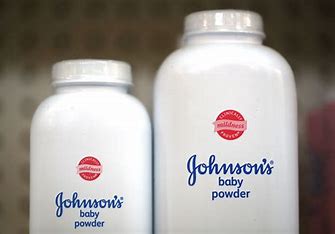
One of the world’s leading pharmaceutical company Johnson & Johnson has been hit by 11,000 more lawsuits linking baby powder to cancer after judge throws out $9 billion settlement case.
Fortune reported: Johnson & Johnson has seen at least a 28 per cent surge in new lawsuits claiming its talc-based Baby Powder causes cancer a little more than five weeks after the company’s plan to resolve the cases was tossed from bankruptcy court.
A New Jersey judge overseeing all the federal talc litigation said in a September 6 court hearing that more than 11,000 new complaints have been filed, according to a court transcript. J&J had sought to resolve at least 40,000 talc suits for about $9 billion through the bankruptcy of its LTL management unit, which was created to end health claims tied to talc allegedly tainted with a toxic substance. But a bankruptcy judge threw the case out on July 28.
The escalation in claims is likely to complicate efforts by J&J to settle almost a decade of suits alleging talc-based Baby Powder causes ovarian cancer and another cancer linked to asbestos exposure. The company, which has appealed the bankruptcy’s dismissal, is preparing to defend itself in a state-court trial in California that’s slated to start next month.
J&J faces a spate of jury trials early next year over allegations its executives knew since the early 1970s that talc contained trace amounts of asbestos, but failed to alert consumers or regulators. J&J contends its talc-based products don’t cause cancer and the company has marketed Baby Powder appropriately for more than 100 years.
Ars Technica reported: Compared with other countries, the US is again seeing exorbitant prices for medicine – even one it helped develop. In the current Covid-19 booster campaign, the Centres for Disease Control and Prevention is paying around $82 for each dose of Moderna‘s 2023–2024 updated mRNA Covid-19 vaccine for its program to provide vaccination for the uninsured.
That price is a little over three times the $26 per dose the federal government paid for the last updated booster, which was exclusively distributed by the government. The price hike marks the vaccine’s move from federal distribution to the commercial market. Moderna and rival manufacturer Pfizer raised the US list price of their Covid-19 vaccines by roughly 400 per cent. (Moderna’s is listed at $128 and Pfizer’s is $115).
The price hike is particularly remarkable from Moderna, which developed its Covid-19 vaccine with substantial assistance from the federal government. It developed the vaccine in partnership with the National Institutes of Health and got $1.7 billion in federal grant money for its clinical development.
In a March congressional hearing on the vaccine’s pricing, Moderna CEO Stéphane Bancel – who became a billionaire during the pandemic – unabashedly defended quadrupling the price. Specifically, Bancel downplayed the US government’s contribution and suggested the earlier pricing was actually a discount. Now, adding insult to injury, the European Union may end up paying three times less than the US for the same vaccine.
Reuters reported: Dawn Heidlebaugh felt trapped in a disturbing pattern while taking Ozempic, the popular drug used to treat diabetes and obesity.
Each Sunday for more than a year, the 53-year-old Ohio real estate agent took her weekly injection to help control her blood sugar. Then every Tuesday, she felt lethargic, depressed and sometimes suicidal, thinking her husband and four children might be better off without her. These feelings would last a few days, and the cycle repeated every week – except when she skipped a dose.
Heidlebaugh is one of four US patients who told Reuters about experiencing suicidal thoughts while taking Novo Nordisk’s popular Ozempic drug, approved to treat type 2 diabetes or Wegovy, another Novo top-seller approved for weight loss.
A fifth patient said he experienced depression and suicidal thoughts after taking Mounjaro, a similar diabetes medicine from Eli Lilly, which is also used for weight loss. All three drugs are GLP-1 receptor agonists, which slow digestion and reduce hunger.
Accounts of suicidal thoughts linked to this class of drugs are drawing increasing scrutiny, including an investigation by European regulators announced in July. In a statement to Reuters, the FDA said it is evaluating such reports and will decide on what action, if any, to take after a thorough review.
Fox News reported: A new study from the Memorial Sloan Kettering Cancer Centre has revealed a major side effect of the oral medication alpelisib that is prescribed to breast cancer patients.
The research, published by Wiley in the peer-reviewed American Cancer Society journal CANCER, found that the drug has caused elevated blood sugar rates, or hyperglycemia, in some people. Among 147 patients who were treated with alpelisib, the rate of hyperglycemia was 80.3 per cent, according to a press release summarizing the study.
Reuters reported: Eli Lilly and Co and a former employee agreed to settle a lawsuit in which the worker claimed she was terminated after pointing out poor manufacturing practices and data falsification involving one of its blockbuster diabetes drugs, according to court filings. The former human resources officer, Amrit Mula, contended in the lawsuit that she repeatedly urged leaders at a New Jersey plant to remedy problems involving several biologic drugs, including Type 2 diabetes medicine Trulicity.
Lilly called Mula a non-scientist whose allegations were “simply wrong,” according to court filings. Both sides reached a tentative agreement this year and were working to finalise the settlement, according to an August court filing.
The New Jersey facility has been under scrutiny by the US Food and Drug Administration since 2019 when inspectors found quality control data had been deleted and not appropriately audited, Reuters has reported. The plant has also produced several cancer medications and a Covid-19 therapy.
STAT News reported: The World Health Organization has recommended dropping a component of many flu vaccines because the viruses it protects against appear to have been driven into extinction in the Covid-19 pandemic.
A family of viruses known as influenza B/Yamagata has not been seen since March 2020, when flu circulation worldwide declined to very low levels in the face of the onslaught of COVID and the protections people took to avoid contracting it. Flu transmission eventually resumed but of the tens of thousands of influenza B viruses detected and subtyped in the years since, B/Yamagata viruses have not been seen.
The recommendation was made following a weeklong meeting of flu experts from around the world who gather twice a year at the WHO to study circulating flu viruses to advise on what future versions of flu shots should protect against. This week’s meeting was held to recommend what viruses should go into the 2024 Southern Hemisphere’s winter shot.
In addition to the fact that there is no benefit to including B/Yamagata viruses in the vaccine at this point, there is a theoretical risk of doing so. Manufacturers must grow B/Yamagata viruses for inclusion in the vaccines. In most flu shots – the types that are injected – those viruses are killed at a point in the manufacturing process. But a leak from a manufacturing plant could theoretically reintroduce B/Yamagata viruses into the world, a report from the meeting noted.
The Hill reported: The US Food and Drug Administration (FDA) on Thursday approved the medication Exxua to treat major depressive disorder – a significant step after a decades-long battle for approval.
Exxua is unique for its ability to target the serotonin 1A receptor, which is a regulator of mood and emotion. In doing so, it avoids undesirable side-effects that often come with drugs that treat anxiety and depression disorders, including sexual dysfunction and weight gain, according to the press release from drug manufacturer Fabre-Kramer Pharmaceuticals.
The FDA had previously rejected the drug’s approval twice, reportedly as a result of some failed studies.
The recent studies, according to the pharmaceutical company, were conducted in over 5,000 patients and proved to have “an overall acceptable safety profile, with no significant adverse effect on weight, blood pressure, heart rate or liver function.”
Dizziness and nausea were sometimes side effects but they were described as “mild, of short duration, related to dose escalations and did not require discontinuation of treatment.”
Toronto Star reported: Health Canada has authorized the use of a second updated Covid-19 vaccine, giving the green light Thursday to Pfizer’s reformulated shot that will be rolled out in the coming weeks.
Targeted to better match currently circulating variants, Pfizer-BioNTech’s newest Covid vaccine is approved for those six months and older. Its clearance comes with Covid cases on the rise and follows the authorization of Moderna’s updated vaccine, which was approved by Health Canada earlier this month.
Reuters reported: A German court on Thursday put on hold a patent trial brought by German biotech firm CureVac against domestic rival BioNTech over the use of mRNA technology in Covid-19 vaccines, weighing on CureVac’s shares.
The Duesseldorf regional court said it suspended its proceedings until the German and the European patent offices decide on a legal challenge filed by BioNTech over the validity of CureVac’s intellectual property rights.
CureVac’s efforts to develop an mRNA-based Covid-19 vaccine did not succeed during the pandemic, while BioNTech generated about 17 billion euros ($17.96 billion) and 19 billion euros in annual sales in 2022 and 2021, respectively, thanks to its successful coronavirus vaccine business with partner Pfizer.
- The Defender report











